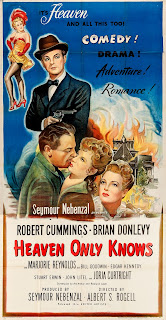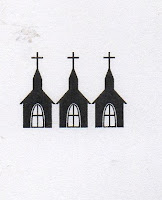Heaven Only Knows (1947)
As we have said oh so many times, this is a blog about Churches and Clergy in movies. It isn’t about theology, but obviously, the subject comes up on occasion. And my goodness, Hollywood theology is, um, interesting. Heaven Only Knows, to its credit, branches out from the usual Big Screen Bad Theology.
Many films (It’s A Wonderful Life is a prime example) portray angels as humans who have died and gone to heaven. According to the Bible, angels are completely different creations from people, though they have the ability to take on the appearance of people. But they don’t always, or even usually, look like people as far as we know. In chapter six of his book of prophecy, Isaiah describes seeing “seraphim” with six wings: two for covering their faces, two for covering their feet, and two for doing the flying. That doesn’t sound at all like Robert Cummings, but in this film, he portrays the Archangel Michael.
The story begins in some kind of heavenly board room. A group of “angels” (all white men) discuss a problem case on Earth (apparently one of their many areas of responsibility -- and the most troublesome). Adam “Duke” Byron (Brian Donlevy), can’t be found in the “Book of Destiny” and therefore, in the theology of this film, doesn’t have a soul. Adam was born in San Francisco in 1858, moved to Glacier, Montana, and was supposed to marry the minister’s daughter, Drusilla Wainwright (Jorja Cuthright). Instead had become the owner/manager of a saloon/gambling hall. To save Adam, Michael is sent to Earth to see to it that Adam marries Drusilla. Yes, according to the theology of this film, Adam’s salvation is to be found in “the love of a good woman.”
So Michael goes to Earth and finds himself living in the Wild West. The town of Glacier is in the midst of a feud between saloon owners; Adam Duke vs. Bill Plumber (Bill Goodwyn) and the citizens of the town are caught in the crossfire.
Drusilla calls a town meeting and argues that they should take the law into their own hands and get rid of men like Plumber and Duke. Her father arrives at the meeting, and he is not pleased. The Reverend Wainwright (John Litel) tells the townspeople that he has long prayed they would come together, but not this way. He admits, “It’s easier to feed a man’s evil instincts than feed his family.” He blames the sheriff for not dealing with the problem of the casinos at war, “If a disciple of law and order were on the job, it would be easier to be a disciple of the Lord.” He bemoans the situation but doesn’t offer a solution.
Then the sheriff bursts into the meeting and offers a solution. He says the townspeople should just lay low until the warring parties kill each other off. He says he's heard that the Kansas City Kid has arrived and that he'll probably clear out the riffraff and then clear out himself.
Drusilla says if the sheriff’s system doesn’t work, they’ll resort to their own system.
Meanwhile, when Michael comes to town, he's mistaken for the gunslinger, who was hired to take out Duke. When instead he saves Duke’s life, Duke hires him. When Duke's saloon, Pair of Dice, is attacked, Michael takes Duke to safety in the schoolhouse. Drusilla, the schoolteacher, is not pleased but allows it.
Duke is looking for some way to get back at Plumber. so Michael tells him he knows a source of great power -- and takes him to church. Duke says, “Don’t you beat the devil?”
Meanwhile, when Michael comes to town, he's mistaken for the gunslinger, who was hired to take out Duke. When instead he saves Duke’s life, Duke hires him. When Duke's saloon, Pair of Dice, is attacked, Michael takes Duke to safety in the schoolhouse. Drusilla, the schoolteacher, is not pleased but allows it.
Duke is looking for some way to get back at Plumber. so Michael tells him he knows a source of great power -- and takes him to church. Duke says, “Don’t you beat the devil?”
Michael responds, “I try.”
Michael has Duke put money in the offering box. Duke asks how this is all going to help him, and Michael says, “You’ve learned we’re all on a journey together and this (church) is like a post office where we come to get our mail.” Duke realizes Michael is talking about spiritual things, and he is not pleased.
But the townspeople eventually decide to take justice into their own hands and come to lynch Duke. They believe Duke is hiding in the church, but he and Michael have escaped out the back. Rev. Wainwright blocks the mob from entering the church, saying, “I’ve preached for years against the rope and gun.”
Duke goes to Drusilla and asks her to run off with him. She gets him a horse, and they ride out of town, but Drusilla won’t stay with him if he stays in his old life in saloons and gambling halls. She says that’s a life of sin, and Duke asks, “What’s good? What’s bad? The only sin I know is being alive and not doing anything about it.”
Michael has Duke put money in the offering box. Duke asks how this is all going to help him, and Michael says, “You’ve learned we’re all on a journey together and this (church) is like a post office where we come to get our mail.” Duke realizes Michael is talking about spiritual things, and he is not pleased.
But the townspeople eventually decide to take justice into their own hands and come to lynch Duke. They believe Duke is hiding in the church, but he and Michael have escaped out the back. Rev. Wainwright blocks the mob from entering the church, saying, “I’ve preached for years against the rope and gun.”
Duke goes to Drusilla and asks her to run off with him. She gets him a horse, and they ride out of town, but Drusilla won’t stay with him if he stays in his old life in saloons and gambling halls. She says that’s a life of sin, and Duke asks, “What’s good? What’s bad? The only sin I know is being alive and not doing anything about it.”
She goes back toward town and finds that the townsfolk have decided that if they can’t hang Duke, they’ll hang Michael, Duke's supposed henchman.
They set Michael on a horse and put a rope around his neck. But no matter how many times they whip the horse, the horse won’t move.
Reverend Wainright comes with his congregation to oppose the lynching. He preaches, “Today I am going to tell you the story of a man who lived, and died and rose again.” Strangely, he never says the name of “Jesus.” Perhaps the studios were afraid that actually saying the Lord’s name would be too much for the audience or would seem somehow sacrilegious. His words fall on deaf ears, and the lynchers still try to get that horse to move.
Duke returns. He cuts Michael down and takes him off the horse. Duke says he’ll go back to town, marry Drusilla, and start a new life. Perhaps even join the church choir. And Michael boards an unscheduled coach that will take him back to Heaven.
So what Movie Churches rating do we give the Reverend Wainwright and his church? He’s been preaching in Glacier for years, but his ministry seems to have had no great impact on the morals of the town. His theology doesn’t seem to be much more solid than Hollywood’s, but he does stand up to a lynch mob. For that, he earns Three Steeples.
They set Michael on a horse and put a rope around his neck. But no matter how many times they whip the horse, the horse won’t move.
Reverend Wainright comes with his congregation to oppose the lynching. He preaches, “Today I am going to tell you the story of a man who lived, and died and rose again.” Strangely, he never says the name of “Jesus.” Perhaps the studios were afraid that actually saying the Lord’s name would be too much for the audience or would seem somehow sacrilegious. His words fall on deaf ears, and the lynchers still try to get that horse to move.
Duke returns. He cuts Michael down and takes him off the horse. Duke says he’ll go back to town, marry Drusilla, and start a new life. Perhaps even join the church choir. And Michael boards an unscheduled coach that will take him back to Heaven.
So what Movie Churches rating do we give the Reverend Wainwright and his church? He’s been preaching in Glacier for years, but his ministry seems to have had no great impact on the morals of the town. His theology doesn’t seem to be much more solid than Hollywood’s, but he does stand up to a lynch mob. For that, he earns Three Steeples.





No comments:
Post a Comment